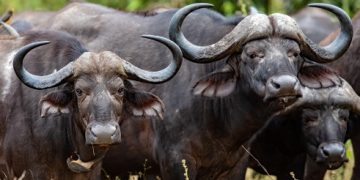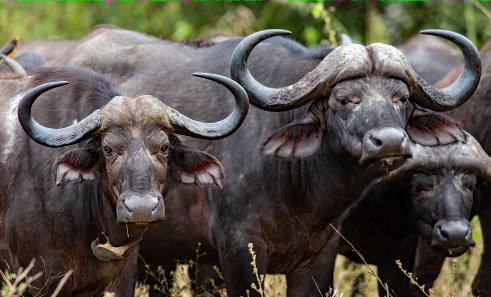On October 4, 2024, Chief Magistrate Betty Ojok presided over a court session in Kasese, where Yowasi Mulengya was sentenced to nine years in prison or an alternative fine of 8 million shillings for the unlawful killing of a protected wildlife species, following his guilty plea.
Mulengya was apprehended by the Uganda Peoples Defense Forces (UPDF) on June 26, 2024, in Ibuga Village, Kitswamba sub-county, Kasese district, after receiving information from local residents. He was reportedly found in possession of two buffalo horns, four buffalo hooves, three kilograms of buffalo meat, two kilograms of warthog meat, and a spear.
The UPDF subsequently transferred him to the Uganda Police, which coordinated with UWA to manage the case.
The UWA prosecutor Reuben Ngene presented evidence, urging that the accused’s actions harmed both Uganda’s conservation efforts and its economy.
He highlighted that the critical role of wildlife in Uganda’s tourism sector, which generates significant revenue.
Ngene further submitted that the animals killed by Mulengya are prey for carnivores such as lions and leopards.
He noted that the depleting of their prey forces these predators to attack livestock, increasing human-wildlife conflict and adding to government compensation costs.
The prosecution urged for a strong sentence to deter others.
Mulengya, represented by Counsel Luke Kanyonyi, sought leniency, but the court sentenced him to a fine of shs8million or nine years in prison on each count, with the sentences to run concurrently.
The magistrate emphasized the need to protect Uganda’s wildlife and the ecological balance.
UWA applauded the judiciary, UPDF, Police and the communities for supporting wildlife conservation efforts in the country and reaffirmed UWA’s commitment to combating illegal wildlife activities.
“We hope that this case serves as a significant step in deterring future offenses. Through the ongoing campaigns and enhanced enforcement efforts, we remain steadfast in our mission to protect endangered species and preserve the country’s rich biodiversity,” read the statement.


































